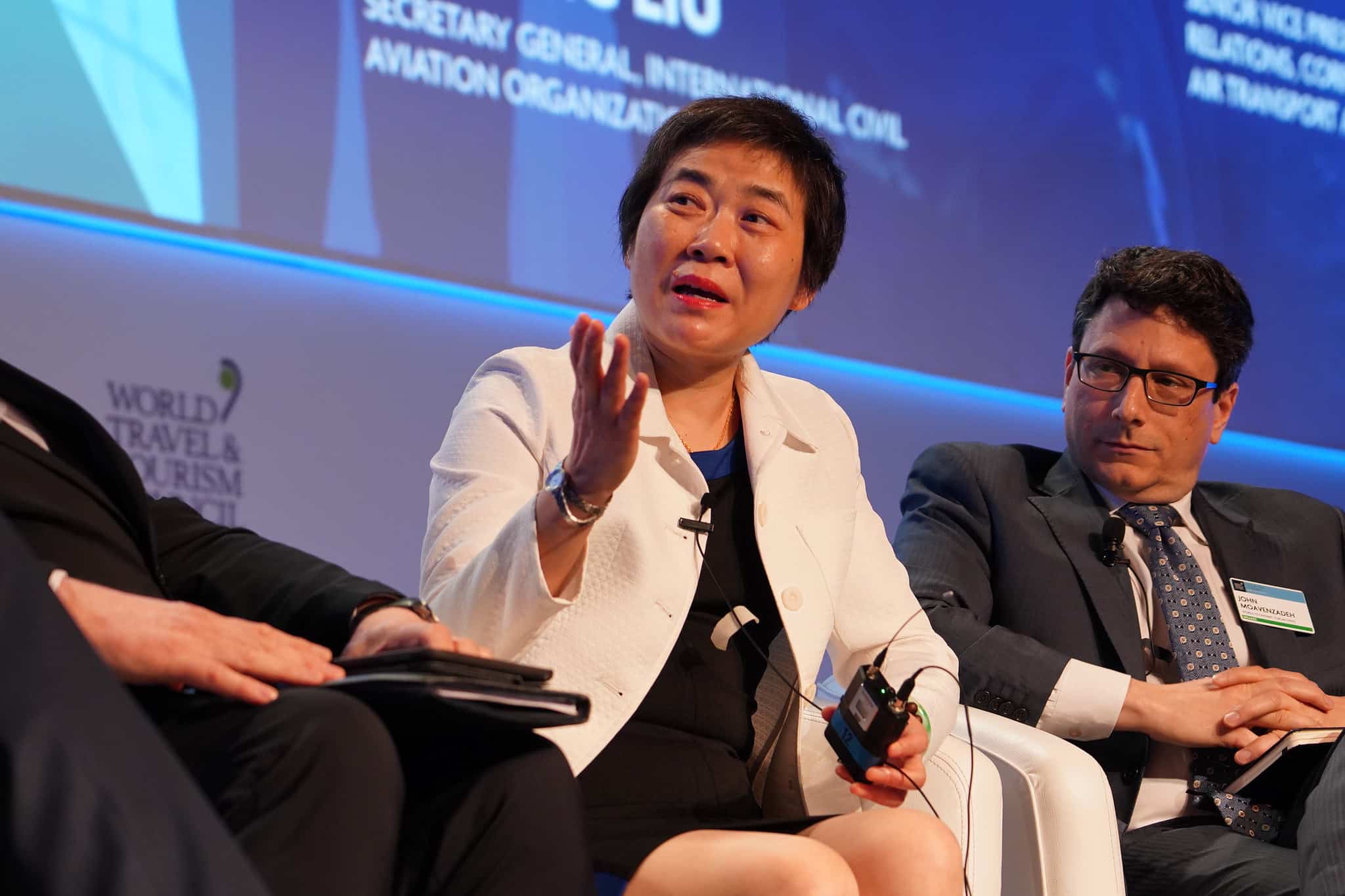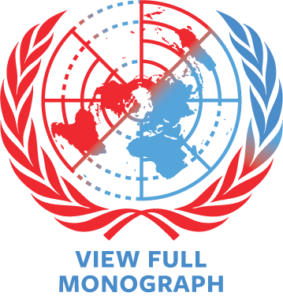June 30, 2021 | International Organizations Monograph
International Civil Aviation Organization
Contents
June 30, 2021 | International Organizations Monograph
International Civil Aviation Organization
Introduction
In 1944, representatives of 52 countries signed the Convention on International Civil Aviation, commonly known as the Chicago Convention.1 In order “to develop the principles and techniques of international air navigation and to foster the planning and development of international air transport,” the convention established the Montreal-based International Civil Aviation Organization (ICAO), which became a UN specialized agency in 1947.2
ICAO adopts technical standards and recommended practices to achieve uniformity in the development, organization, and oversight of international aviation. The agency is not a global regulator, since it cannot impose or enforce standards. Rather, it assists in their adoption and implementation.3
The ICAO Assembly, consisting of representatives from all 193 UN member states, elects 36 members of the ICAO Council to three-year terms.4 The council approves changes to aviation standards, administers the organization’s finances, and submits annual reports to the ICAO Assembly.5 The council also elects a council president and appoints a secretary general to lead the ICAO Secretariat, the agency’s “administrative and expert bureaucracy.”6
ICAO’s work helps the United States promote safe, secure, and affordable global aviation, an industry essential to all economies. According to ICAO, global airline traffic is projected to reach 10 billion passengers per year on 90 million flights by 2040.7
For fiscal year 2021, the estimated U.S. assessed contribution to ICAO is $16.4 million, comprising 20.5 percent of the agency’s budget.8 The United States also provides voluntary contributions annually, often to support aviation security initiatives, including $1.2 million in 2019.9 In 2019, the United States withheld approximately $2.4 million in contributions pursuant to Sec. 7048(a) of the fiscal year 2019 Consolidated Appropriations Act, which mandates the withholding of 15 percent of contributions to international organizations that do not implement sufficient whistleblower protections.10 The State Department has since restored full funding.
Problems
Since 2015, Dr. Fang Liu has served as ICAO’s secretary-general, making the global aviation body one of four UN specialized agencies headed by Chinese nationals in 2021.11 Liu previously spent two decades as a senior official in China’s state-owned General Administration of Civil Aviation. Liu’s tenure as secretary-general deserves significant scrutiny.
A Canadian Broadcasting Corporation investigation revealed a breach of ICAO’s servers by a Chinese state-sponsored hacker group in early 2019, three years after the hack occurred.12 The hackers reportedly gained access to the agency’s system through a compromised laptop belonging to the son of then-ICAO Council President Olumuyiwa Benard Aliu. The hackers compromised the laptop while the son, who was also an ICAO official, was in Beijing.13 Leaked documents show that ICAO staff sought to cover up the incident, and Liu reportedly “shelved internal recommendations” to investigate further.14
A senior official-turned-whistleblower accused Liu of “toxic and hostile” leadership marked by “cronyism” and “favoritism.”15 Notwithstanding a process put in place to review those complaints, no investigation took place.16 ICAO fired the whistleblower in December 2019.17

Dr. Fang Liu, secretary general of ICAO, speaks at the World Travel & Tourism Council’s Global Summit on April 18, 2018, in Buenos Aires, Argentina. (Photo by World Travel & Tourism Council via Flickr)
In response to these events, the State Department withheld funds from ICAO, asserting that the agency “mishandled allegations of wrongdoing and retaliation by the Secretary-General,” and that “the ICAO Secretariat would not implement a newly revised whistleblower protection policy approved by the Council.”18 Yet by September 2020, the department elected to pay the withheld amount after determining that ICAO had “implemented key ethics and oversight reforms” at the urging of the United States, “despite pushback from the Secretariat and a number of member states.”19
Separately, ICAO has systematically excluded Taiwan throughout Liu’s tenure, in apparent deference to China’s political demands.20 Taiwan, as a non-member, was last invited to ICAO’s triennial assembly in 2013, prior to Liu’s appointment.
In 2018, the agency reportedly ignored Taiwan’s concerns about Chinese flight routes in the Taiwan Strait and omitted Taiwan’s Taoyuan International Airport from its list of the world’s busiest airports despite the airport’s having the 11th-largest volume of traffic.21 At the beginning of the COVID-19 pandemic, ICAO barred Taiwan – a major aviation hub near the center of the outbreak – from discussions on best practices to slow the spread of the virus. ICAO’s official Twitter account subsequently blocked voices critical of the decision.22
In 2013, Senator Bob Menendez (D-NJ) and Representative Ed Royce (R-CA) introduced legislation directing the U.S. secretary of state to “develop a strategy to obtain observer status for Taiwan” at ICAO, which was later signed into law by President Barack Obama.23 A bipartisan letter from U.S. lawmakers in February 2020 condemned ICAO’s exclusion of Taiwan, and Senator Ted Cruz (R-TX) specifically criticized Liu for “pursuing the agenda of [her] former employer rather than the mission of the ICAO.”24
ICAO has also been mired in controversy surrounding the downing of Ukraine International Airlines Flight PS752. Iran’s Islamic Revolutionary Guard Corps (IRGC) shot down PS752 on January 8, 2020, killing 176 civilians. Iran declined to close its civilian airspace in the hours following Iranian ballistic missile strikes against U.S. forces in Iraq.25 An IRGC missile defense unit subsequently downed PS752.26 The incident exposed the need for ICAO to pursue stronger, tailored enforcement mechanisms beyond diplomatic engagement when member states are suspected of violating the Chicago Convention. Institutional reforms aimed at reducing the risk of future attacks and ensuring national authorities pursue credible investigations may also be necessary. In this case, Iran used weapons against a civilian aircraft, failed to safeguard the wreckage, and then conducted a flawed investigation. Thus far, the Islamic Republic has faced no ramifications at ICAO.
Recommendations
On February 25, 2021, the ICAO Council appointed Juan Carlos Salazar of Columbia to be secretary-general beginning August 1, 2021, when Liu’s term ends.27 The United States should undertake a review of how ICAO can become more effective in addressing challenges to civil aviation. This review could include a congressional request for a U.S. Government Accountability Office report on the agency. The United States should also:
- Champion Taiwan’s bid for observer status. The United States should push ICAO to grant Taiwan observer status. By barring Taiwan from participating in its assembly sessions, ICAO undermines aviation safety in Asia. Taiwan’s exclusion allows China to take unilateral actions, such as instituting new flight routes, without addressing regional safety concerns.
- Prioritize ethics reforms. The Biden administration should support candidates for ICAO leadership positions who have a record of impartiality and integrity and commit to implementing the agency’s revised Framework on Ethics and the UN Standards of Conduct. Moreover, the United States should push ICAO to fully implement ethics and oversight reforms, including a new mechanism to investigate allegations of misconduct by any secretary general or council president. These measures will ensure greater transparency, accountability, and independence. If the agency reneges on reforms, the United States should once again withhold a portion of its contributions.
- Support reforms to conflict-zone safety standards. The United States should encourage the adoption and full implementation of the remaining Safer Skies proposals for conflict zones, which Canada developed following concerns over Iran’s handling of warnings, risk management, and airspace preceding the downing of PS752.28
- Support reformed standards to ensure transparency and accountability. The United States and its partners must hold Iran and all ICAO member states to their treaty obligations, including those concerning transparent, comprehensive investigations. As a Canadian government report on PS752 concluded, Iran, “[t]he party responsible for” downing the airliner, “investigat[ed] itself, largely in secret. That does not inspire confidence or trust.”29 Efforts to improve compliance and transparency in aircraft incident investigations like the PS752 case also deserve full U.S. support.
- Push for implementation of enhanced security standards. State and non-state threats to global civil aviation are evolving. The United States should lead efforts within ICAO to continue the implementation of new security standards, such as measures endorsed in UN Security Council Resolutions 2396 and 2309, the latter of which calls on ICAO “to effectively address the threat posed by terrorist targeting of civil aviation.”30
